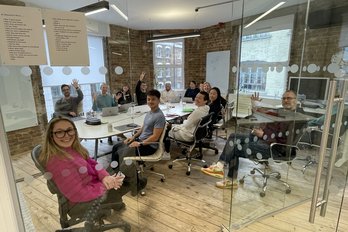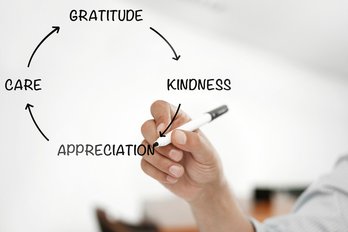Asking for help is a strength, not a weakness. It’s how we learn, how we solve problems and how we do good work.
We are a curious bunch at Unboxed. We want to understand our clients' knotty problems. We want to ask questions because we know we aren’t the experts in people’s businesses. So we need to be curious, open and able to say, “I don’t know, I need you to help me understand”. Only then can we get the full picture and come up with the best solutions.
We do this by working collaboratively, with our clients and within our team. We have to get to grips with new concepts, complex problems and learning new skills. So it’s vital that we all feel empowered to ask for the help we need when we need it.
Two things we should all be noticing
1. Noticing what you need
I asked Unboxeders “What are the signs you notice when you need help at work? What behaviours or emotions do you see?”
The responses had familiar themes:
Noticing when we are struggling to articulate a problem. When it’s difficult to see the wood for the trees. When a small problem becomes a big one. Procrastinating, or avoiding the issue. Working longer hours to solve a problem. Losing focus and jumping around different tasks. Feeling more panicky or tearful, or having to take yourself away to calm down and refocus. Uncomfortable experiences when people are struggling with something or feeling really stuck.
2. Noticing what others need
I also asked Unboxeders “What are the signs a colleague might need help at work?”
Again, we could agree on a number of common threads:
Blocked work or taking longer than it should. Someone becoming more withdrawn, absent or evasive. More frustration in their communication than usual. Avoiding a task. Getting more easily upset or becoming quiet, not quite their usual selves. Looking tired and troubled.
Noticing the behaviour of our colleagues and our own behaviour is really important. Taking notice is part of the Five Ways to Wellbeing, and it also aligns with our Unboxed values of care and attention and healthy relationships.
Why we find it hard to ask for help
It takes courage to acknowledge our limitations and seek help from others, even when we know it’s the best thing to do. There is a strong social threat to our sense of self associated with asking for help. We don’t want to appear incompetent. We want to portray ourselves as capable and self-reliant. And we don’t want to feel rejected if we make ourselves vulnerable by asking for help.
We are all shaped by our experiences. We may have learned from an early age or from our workplaces that not knowing, or asking for help may be seen as a sign of weakness. We may have learnt that in some situations it is even dangerous. This is very challenging to unlearn and takes time to build trust that it’s OK to show vulnerability.
Having autonomy over what we do is very important for our self esteem. And for our motivation and engagement. If demands are high and challenging but the necessary support is available, we thrive. If demands are high but the resources aren’t in place, our sense of control is compromised. Asking for help can feel like a relinquishing of our autonomy. This is stressful and when we really need to be asking for the help we need.
How often have you said, or heard someone say, “I don’t want to be a bother”? We don’t want to feel we are imposing on others. Especially when they are busy. But, people generally want to help others. Acts of kindness have a powerful and reciprocal positive impact on our wellbeing.
The personal and professional cost of failing to ask
There is both a personal and professional cost to failing to ask for help. On an individual level, our mental health and wellbeing can suffer. At the extreme end it can lead to burnout. It can hinder our own growth, affect the quality of our work and our relationships in the workplace.
By struggling in silence projects may be delayed or compromised. And when we fail to ask for help there is often an impact on our colleagues as well as our clients. Others may have to pick up extra work putting further strain on them. Client trust can be impacted and organisational reputation affected. Recognising the impact of our actions on others helps us to appreciate the importance of reaching out for help when we need it.
Some things we can do
Leaders and organisations need to encourage kind and supportive workplace cultures. Environments where people feel safe to ask for help, whether they are a senior, lead or junior. There are always things we don’t know, no matter how much experience we have. So feeling you won’t be compromised or experience that social threat when you need help is important. This is a challenge for organisations. Particularly when they are under many different pressures. But leaders who show that they sometimes need help too, lead by example.
We don’t always get this right at Unboxed. But we do work hard to encourage and build good relationships where colleagues are happy and willing to help each other. Whether that’s with an onboarding buddy, a peer mentor, a delivery manager or a colleague. Taking notice and communicating in the open about what we need or what we are struggling with is vital. Delivering complex projects is a team sport and everyone needs to feel they can play their role.
As individuals we need to consider whether something we are struggling with is really our responsibility. It can make the difference between doing something badly and feeling incapable, over feeling empowered. If someone else is better placed for the task or you feel ill-equipped, ask a colleague for help.
How we communicate that we need help is important. Finding the right person to ask and doing it in a timely way makes people much more receptive to offering help. Pausing to consider these things reduces the feeling of imposing on others and getting to a solution quicker.
As individuals and organisations, helping people ask for help is an ongoing piece of work. We need to keep working on removing the blockers that prevent us from seeking the help we need to do good work, to keep learning and build kind workplaces.




